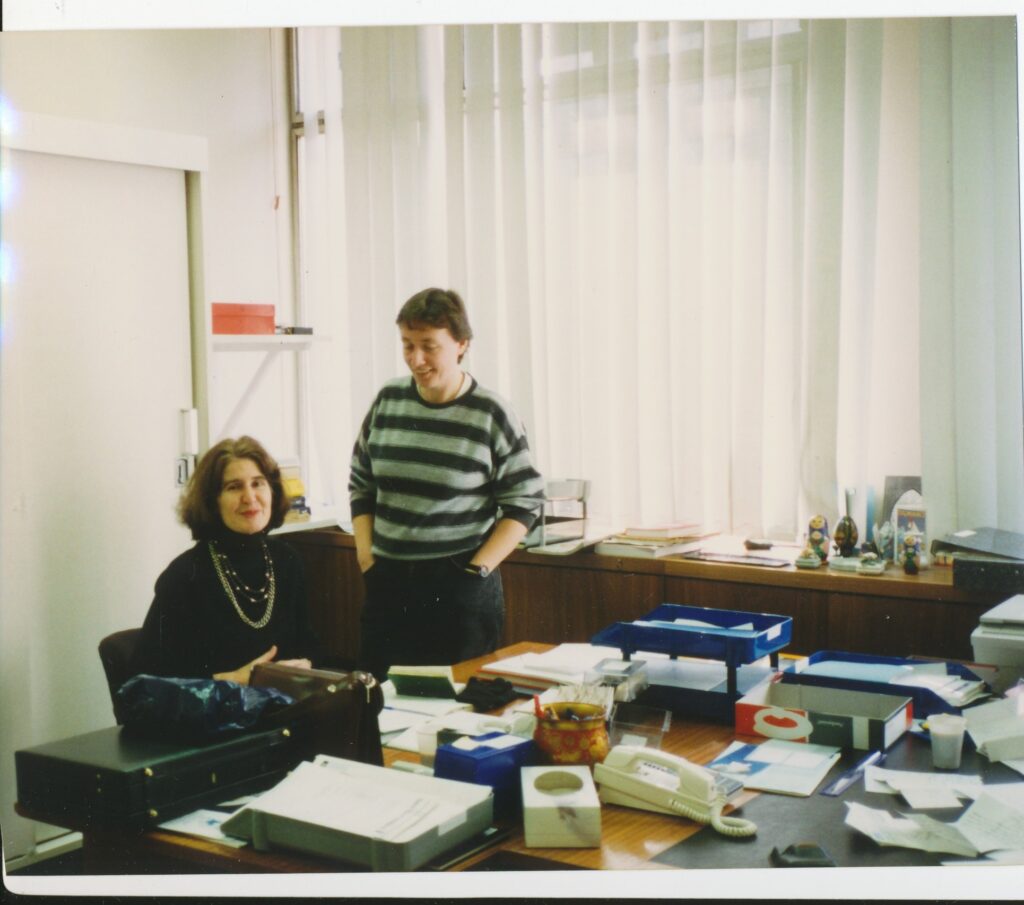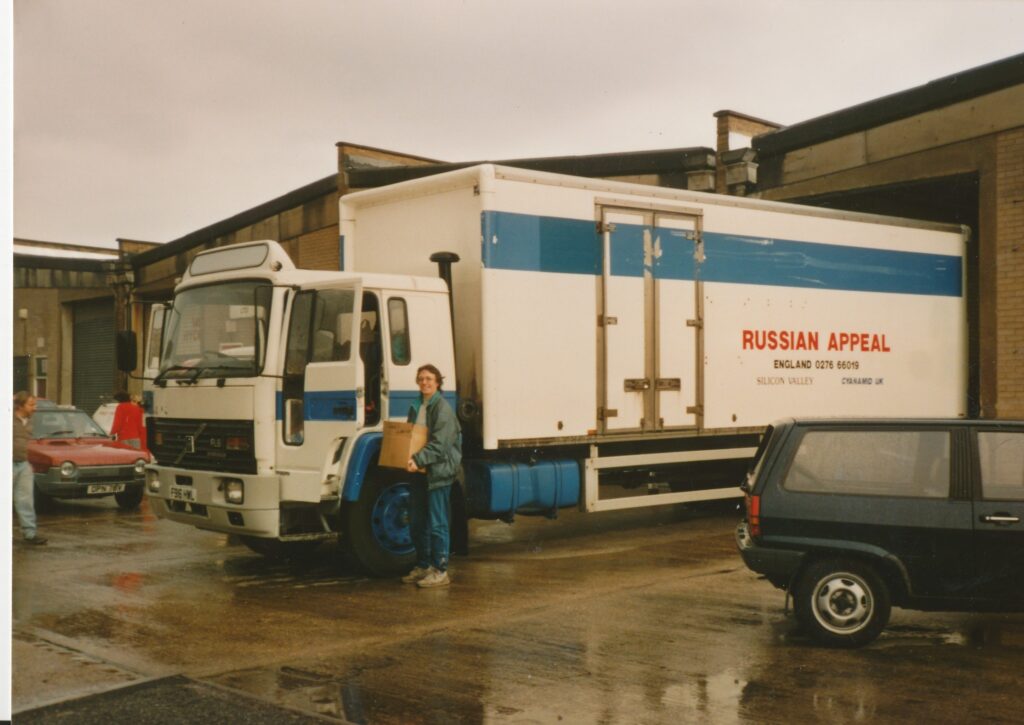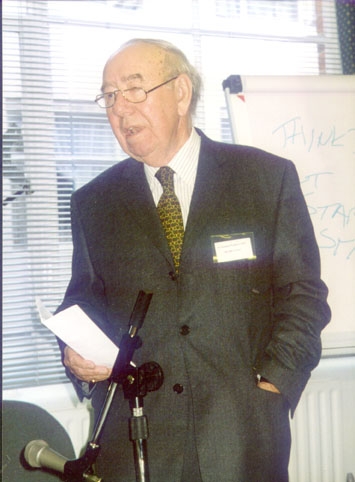The BEARR Trust: The Beginning
1991 – 2001
Through speaking to a handful of the characters involved in setting up BEARR, a picture emerges of an infancy characterised by remarkable resourcefulness and adaptability, slight organised chaos, and above all compassion for those facing hardship.
It was this goodwill, and a shared sense of urgency in the face of the economic and social turmoil that followed the collapse of the Soviet Union, which brought BEARR’s future supporters together from a diverse range of backgrounds – the charity sector, diplomatic, legal. Some, including current trustees Nicola Ramsden and Marcia Levy, were already based in Moscow in the early 1990s, where Marcia chaired an advisory committee. Others, including current patron Ellen Dahrendorf, assisted from London by forming a board, organising the official launch of The BEARR Trust, and fundraising from a London-based office base donated by De Beers.
The central force among these figures was the late Lady Jill Braithwaite [1]. When her husband, Sir Rodric Braithwaite, became the British ambassador to Moscow in 1988, Jill responded to the suffering she found, particularly among women and children, by setting up BEARR.

The healthcare plight she witnessed had been intensified by recent events, including the Chernobyl disaster in 1986; the Armenian earthquake of 1988, and the collision of two trains in Russia in the summer of 1991, which left many children badly injured and burned. Following these tragedies, experts from the West were officially allowed to enter hospitals, and in due course a specialist in healing cleft palates would be the first medical practitioner brought from the UK, through BEARR, to train others to help children affected in this way by Chernobyl.
Alongside these developments, the sudden break-up of the Soviet Union in 1991 disrupted manufacturing and distribution, and there ensued dangerous shortages of sutures, painkillers, and other basic medical supplies. Jill brought together a small group of women she knew, including Susan Richards and Maria Fairweather, united by a passionate interest in Russia and the region. Together they informally set up the organisation in 1991, and The BEARR (British Emergency Action in Russia and the Republics) Trust began its existence by coordinating the delivery of lorry-loads of humanitarian supplies to those in need, especially those with babies or children. Other names had been suggested for the organisation, including ‘Bridge’ and ‘Phoenix’. But after Theresa Tollemache, who helped to set up BEARR’s London Office, lent her Anthony Burgess’s ‘Honey for Bears’, Jill settled on a name playing with the animal’s national symbolism.
“BEARR’s operations were very hands-on in those days”, says Theresa. She describes how, in the economic crisis that followed the Soviet Union’s collapse, citizens were forced to pay market prices for medicines – prices which were unaffordable to most. In the early days links were made “with whomever we had personal contacts”. Doctor friends in Chelyabinsk and Perm received first aid deliveries, while a musical acquaintance of Theresa’s helped Megan to find accommodation on Smolenskaya, central Moscow, in an apartment block she shared with some glamorous Bolshoi theatre ballet dancers.
Much energy went into working out which individuals and organisations might donate supplies and transport them to Russia by air or lorry, since funding at this stage was limited. Theresa recalls how one day two volunteers came back to BEARR’s London office with a taxi full of prosthetic limbs, which had been donated by the NHS. Another truck was filled to the brim with Lemsip. BEARR’s first annual report in 1992 reviews the medical and humanitarian supplies delivered to areas not reached by government aid programmes, including wheelchairs and sewing equipment which were sent to the Dmitrov Society of Disabled People, and medical supplies transported to Moscow, Tomsk, Dagestan, and Georgia. In 1994, supporters distributed camping equipment for disabled children, purchased with money raised at a chess tournament at the British Embassy, where none other than world chess champion Garry Kasparov and Nigel Short played against 30 participants who had paid for the chance to try their skills against the best.

Megan Bick, now a BEARR trustee, carried out the first of BEARR’s emergency aid trips in 1992 with two drivers; men she had never met. They drove their lorry from London, across Europe and all the way to Chelyabinsk: a large city surrounded by lakes on the eastern edge of the Urals. She describes their unpreparedness fondly:
“Those were wild days. Somehow Rodric had got us all visas. We didn’t have a map, and we didn’t have a back-up plan for what to do if we were forced to re-route. Our lorry had been donated and didn’t lock. It was full to the brim with aid supplies, so I stayed in it every night, sleeping on the seat with a crowbar next to me, while the main driver and his friend got some sleep indoors”.

Once they had crossed into the former Soviet Union in Brest, Belarus, they were provided with a police escort. Theresa admits that they did not fully appreciate the price that the goods being delivered would command on the black market at the time, nor the resulting risk for Megan: organised crime in the region was soaring, and drugs and pharmaceuticals were some of the more valuable commodities. Not only was delivering goods dangerous, but “some of the things being delivered were going straight out the back door”.
BEARR was not entirely sheltered from rising levels of corruption and gang violence in this transitional period. Megan recalls that, when she set up the BEARR office in a basement in Moscow in 1994, she noticed a horrible smell that she assumed to be a dead rat. It turned out to be the body of someone shot and hidden under the stairs.

Provision of emergency supplies was not sustainable in the long term. Even in those chaotic times, local groups were already assembling to distribute aid and provide social support to the more vulnerable members of society – those with disabilities and chronic diseases, as well as older people. BEARR soon shifted its attentions to supporting these fledgling charitable organisations. As immediate demands lessened, it focused on facilitating the exchange of expertise between the West and the former Soviet Union. It was around this time that BEARR was formally constituted as a trust and a registered charity on 18 May 1992, with Sir Norman Wooding as its first Chairman.
Supporting a burgeoning network of health and welfare NGOs in the region was not all plain sailing. BEARR’s founding members faced persistent scepticism as to the organisation’s intentions in a region where the concept of civil society was novel, and where the hardship citizens had endured meant that you could only really afford to help your immediate circle of friends and family. “Society had been so atomised that the idea that people could get together and solve a problem was very strange,” Megan recalls. Dr Harald Lipman [2] describes the similar mistrust he faced when setting up Tushinskaya Trust:
“There were no charities as such in the Soviet Union. When it collapsed, there were lots of people who felt there was money to be made from running a charity, and this blackened many other Russians’ impression of the charitable sector as a whole. Life was very hard, so there was no real drive to help with volunteering. Locals could not understand why foreigners would come over and ostensibly want to help them.”
But BEARR persisted in its endeavours, partly – as stated in one of the declared objectives of its annual report in 1992 – “by means of exchange visits, training programmes and seminars”. BEARR’s annual conferences in London, which started the same year, were one means of exchanging expertise and engendering trust and cooperation between the two regions. The conferences were widely attended, and as early as 1995, Norman Wooding noted that, “amongst those present were the Belarus Ambassador, the Mayor of Perm, and a delegation of senior doctors from St Petersburg”.
BEARR also arranged for well-established UK healthcare organisations to share their know-how and to provide training at events across the region, including holding a conference with Scope UK in Chelyabinsk to advise organisations across Russia working with children with cerebral palsy. Growing this network included the development of twin town links, such as the Oxford-Perm link, which former trustee Deborah Manley, who sadly passed away last year, helped to establish, and which continues to this day.

Myra Green [3] helped BEARR to secure funds from the British Know-How Fund, from the EU’s TACIS [Technical Assistance to the Commonwealth of Independent States] programme, and from USAID, among others. The money secured from these government and international donors funded the development of training packages by experts in the UK, which could be sent to more rural areas and easily adapted to meet local needs. Myra how BEARR’s very practical approach stood out:
“These tailored packages demonstrated the impact that could be made to improve many people’s lives through simple changes, without spending a fortune”.
Other projects included translating practical guides into Russian, such as the ‘Hospice and Palliative Care Handbook’ and WHO’s ‘Practical Guide to the Rehabilitation of Children with Cerebral Palsy’ in 1994.
Throughout this period, BEARR and the other individuals involved learnt to adapt to an ever-changing landscape. Harald Lipman notes:
“Although history was happening around us, we didn’t know it would happen until it did. Things were already unfolding in satellite towns in Eastern Europe, but it all rather rapidly fell apart in 1991. You learnt as you went along because you could only appreciate the situation when you were actively involved in it. One had to be very careful to try and involve locals and not just do things because you felt yourself that it would be right. We had to look at things from the point of view of those we were trying to help, and to take a step back”.
Although BEARR’s early supporters may have been working things out as they went along, their efforts reaped meaningful, long-term results. Megan reflects on how they contributed to the gradual development of a social care system in Russia, which did not yet exist as a concept beyond “home helpers” delivering food to those with limited mobility:
“I would think that the introduction of real social work was one of the best things we ever did. By helping some big players, such as Scope and the National Asthma Campaign, to get into Russia and the FSU, we were the catalyst in some fairly major changes in the development of social care, family planning, fostering, and hospices in the region, among other things”.
Louisa Long
BEARR’s Information Officer
25 August 2021
Read about what happened next here.
[1] 1937 – 2008
[2] 1st Secretary, Medical Attaché to the British Embassy in Moscow 1983 – 1991
[3] Director of BEARR’s London office (1996 – 2000). Myra brought with her a background in development work and had been Overseas Director with Voluntary Service Overseas.